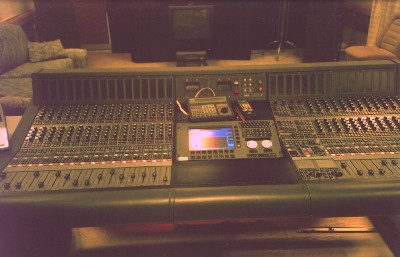
I had one once but the wheels fell off
You could be forgiven for thinking that everything in Plokta is written by a cabal member. This is not so! Next, Claire Goodall, who works for a major British broadcasting corporation, describes the heights superfluous technology can reach when you really take it seriously.
Working in the broadcast industry seems to involve coming across not merely superfluous technology but also the 'because we can' type of equipment. Tape recorders with tapes the size of postage stamps (which are extremely fiddly and only developed as a challenge and are still to find an application). Videotape machines with tracks 19 microns wide (accurate to +/- 1 micron and adjusted with a screwdriver turning 1 degree to move 1 micron). Effects machines that can change the sponsor's logo on a grand prix car as it races around a track or highlight a rugby ball during play.
But one of the greatest concentrations of technology, which turns the science of superfluity into an art form, is in our digital dubbing theatre. The desk itself is merely a base from which you design, in software, the sound desk of your dreams. Include as many channels, groups, outputs as you desire, equip each with the facilities (equalisers, filters etc.) of your fantasies and the transputer network will turn your requests into reality by assigning everything to a part of the desk. If you request more than the current processing power just add more transputer cards. The faders are automated by linear motors (for those smooth, quiet movements) and, like all the controls on the desk, have conductive plastic covers, so when they're touched they update their saved memories. Each fader naturally has four levels allowing the desk to manipulate 128 independent channels at the same time. The knobs, definitely a favourite, have optic fibres running through them and display different things depending on what they happen to be controlling at the time and if they're being touched. The heart of the system is a 24 track hard disc recorder; it's called Audiofile, includes sound manipulation features that must have been included for a bet and backs up onto either optical disk or Exabyte. It makes the 24 track tape machine a little obsolete though. Other features include a touch screen video and audio routing system and as a little added extra the BBC sound effects library awaits on a CD jukebox.
Now you could easily justify the above features, so they added a few extra goodies. To prevent you from tripping on the raised platform behind the desk there's a strip of red LEDs set into the wood to light the step (very pretty and a snip at £100). The Sega Mega Drive, played either on the 26" TV or through the video projector and heard in surround sound, was included as it wouldn't make a difference to the price and keeps production entertained. The sofas are comfy but the fridge isn't supposed to stock beer and I won't bother to catalogue the artwork on the walls.
Finally, one particularly unpleasant experience was the time when I came across a button labelled 'Do not press'. I deny I ever saw it, and I definitely don't know what happens when it is pressed. It wasn't me, honest.
All in all the desk cost about £700,000 and it's jolly impressive to watch the faders move by themselves. Mind you, its charm was stretched for me. Why? I had to maintain the thing.

I had one once but the wheels fell off
Visit the Plokta News Network: News and comment for SF fandom